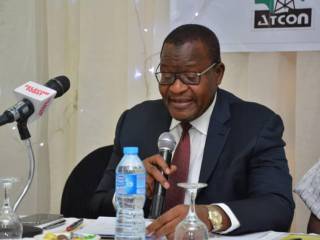The Executive Vice Chairman NCC, Prof. Umar Garba Danbatta, who delivered a keynote address said it is a great honour to deliver a keynote address at the special event with the theme: “The Nigeria National Broadband Plan 2013-2018: Success, Prospects and Challenges”.
Prof. Umar Danbatta stated that Broadband is completely transforming the way essential services are delivered from e-health to e-education to e-commerce and to e-government etc. Broadband Networks deliver benefits across the whole of society in order to meet the Sustainable Development Goals in every sector. These Networks are incredibly cost-effective, especially looking at the savings across multiple sectors. Therefore, the Federal Government of Nigeria (FGN) first step was to establish very clear strategies and milestones for its journey towards national availability of affordable, accessible and available broadband infrastructure and services – The Nigeria National Broadband Plan (NBP).
The EVC said that the Nigeria National Broadband Plan (NBP) is designed to be implemented over a span of five (5) years (2013 – 2018), targeting a five-fold increase of broadband penetration that is 6 % at 2013 to 30 % at 2018. The target areas of the The Nigeria National Broadband Plan (NBP) document are Policy and Regulation, Enabling Infrastructure, Costing and Pricing, Funding and Investment, Driving Demand, Building Fibre Infrastructure, Wireless Broadband Infrastructure, and Upgrade.
Danbatta spoke about the major challenges of the National Broadband Plan (NBP) amongst others are:
1. Inadequate metro fibre infrastructure in several towns and cities that will effectively distribute the adequate bandwidth from international submarine cables at the landing points in Lagos of more than 9 terabits,
2. High Right of Way (RoW) charges,
3. Multiple Regulation & Taxation, and
4. Delays in obtaining site acquisition permits.
He added that by addressing the NBP challenges, the Nigerian Communications Commission (NCC) deliberately developed a Strategic Vision Plan (SVP), which is in sync with the Commission’s Strategic Management Plan (SMP). Further to this, the SVP is centered on eight (8) pillars, so as to attain the broadband penetration target of 30% by 2018.
The 8 pillars are:
1. Facilitate Broadband Penetration
2. Improve Quality of Service
3. Optimize Usage and Benefits of Spectrum
4. Promote ICT Innovation and Investment Opportunities
5. Facilitate Strategic Collaboration and Partnership
6. Protect and Empower Consumers
7. Promote Fair Competition and Inclusive Growth
8. Ensure Regulatory Excellence and Operational Efficiency
The implementation of the Commission’s SVP roadmap has so far resulted in the attainment of 30.9% broadband penetration as at November 2018. What this connotes is that, a total of 58,965,478 were connected to the Broadband Networks out of 108,457,051 internet subscribers in the nation’s telecom networks. The figures rose in December to 60, 087,199 taking the penetration depth to 31.48%.
Broadband successes includes auction of six slots of 2x5MHz in the 2.6 GHz Band, re-planning of the 800 MHz band for LTE, licensing of two slots of 10 MHz each in the 700 MHz band, opening up of the E-band spectrum 70/80 GHz band for both last mile and backhaul services, with other spectrum regulatory instruments such as spectrum trading introduced in the industry, and National Roaming and Active Infrastructure Sharing framework also at its final stage of conclusion.
Danbatta further stated that the Commission is also recently, working with the NBC as mandated by the National Frequency Management Council (NFMC) to develop guidelines for the introduction of TV White Space (TVWS) deployment in the country. This will further deepen Broadband penetration. To add to the Broadband penetration, 6 infrastructure companies (InfraCos) have been licensed to drive the deployment of infrastructure across the nation’s geographical zones and Lagos—while the remaining one (for North Central) is being processed. The subsidy negotiations with the licensees have reached an advanced stage and will soon be concluded.
The EVC then added that although progress has been made in enhancing broadband infrastructure access, there is need to do more. The prospects include,
i. All new sites to be LTE compatible.
ii. Implementation of the Harmonized RoW charges on State Government highways with Federal at the cost of N145/m.
iii. Elimination of Multiple Taxation and Regulations.
iv. Spread 3G coverage to at least 80 % of the Nigerian population, currently 56.4 % of the population are covered with 3G.
v. Complete upgrade of 2G BTS to 3G.
vi. Spread 5G to at least 5 % of the population.
vii. Spread 3G/LTE services to 100 % of the population with a minimum broadband speed of 1.5 Mbps
viii. Deploy at least one Access Point of Fiber with a 10 Gbps capacity in all the 774 LGAs of the Federation through the InfraCo project.
Prof. Umar Garba Danbatta concluded by saying the FGN has recognized the importance of broadband infrastructure and therefore articulated a policy document, The Nigerian National Broadband Plan (NBP). Further to this, the NCC has been resolutely committed to the rapid and pervasive deployment of broadband networks and services in the country, and therefore, developed a Strategic Vision Plan roadmap to address the NBP challenges and ensure the attainment of 30% broadband penetration by 2018. So far, this has resulted in the attainment of 31.48% broadband penetration as at December, 2018.
In attendance was the Minister of Communications, Barr. Adebayo Shittu, Members of the Association of Telecommunication Companies of Nigeria (ATCON), Representative of NITDA, Staff of NCC and other organizations.

